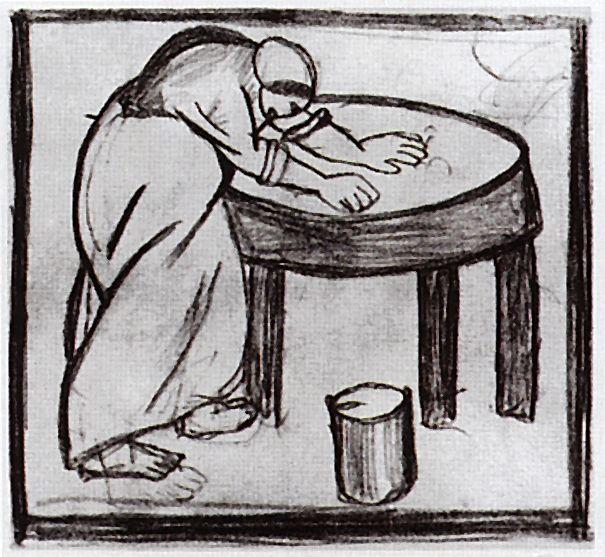Description
In the vast odyssey of modernist art, the figure of Kazimir Malevich stands as a lighthouse of innovation. His painting "Lavandera" (Laundress), although less iconic than his magna work, "black square on white background", is also a window to evolution and the constant search for forms and meanings in the art of the twentieth century.
When observing "Lavandera", the first thing that is obvious is the simplicity and bold use of the color that characterizes Malevich. The central figure, a robust laundress, is presented with a dress of reddish tones, accompanied by a white apron, framing its daily activity. The background, in contrast, is of a dark green color, almost uniform, which gives a sense of depth to the work without distracting from the main subject. The colors used are not mere aesthetic choices; They are reflectors of strength and vitality inherent in the work of the laundress, a tribute to the hardness and dignity of manual work.
Malevich shows a master's degree in the composition by juxtaposing simple geometric shapes with the lavander figure. The clamping of the garment that rins in your hands is defined by clear lines and well -delineated figures, which suggest both movement and stability. The proportions are somewhat exaggerated in favor of a certain expressionist nuance, mainly highlighting the strong arms of women, essential instruments in their arduous daily work. This trait could well be anchored in the tradition of peasant work, a recurring theme in Malevich's work, reflecting not only an aesthetic interest, but also an ideology that emphasizes the common man and its visceral connection with earth and work.
An interesting and little mentioned aspect is the way in which Malevich, even in this representative work, begins to distance oneself from the realistic representation towards a more abstract and constructivist vision. Although here we still clearly identify the lavaera and its activity, the simplification of the forms and disposition of the elements suggest a prelude to that constant search for the essence that will culminate in its suprematism. In "Lavandera" we can already perceive that impulse towards abstraction; The elements of painting They obey an internal logic of painting that does not necessarily follow the rules of faithful representation of reality.
The focus on a working female figure is not accidental. In a time of great social and political changes in Russia, Malevich seems to have proposed to illustrate and dignify the fundamental role of women in society. La Lavandera, in her daily task, is not only an isolated character but a symbol of self -denial and silent force that supports the social structure.
By way of conclusion, "Lavandera" is not only significant within the chronology of Kazimir Malevich, but also as a piece that dialogues with the transformations of the beginning of the 20th century. It is a clear testimony of the artist's ability to transform the mundane into some deep importance. The simplicity of shapes and colors that this holds painting It is, in reality, an exercise of visual and emotional complexity that makes this work an unmissable piece in the study of Russian vanguard art. Through "Lavandera", Malevich invites us to look beyond the surface to understand the multiple layers of human effort and beauty that resides in the simplicity of everyday work.
KUADROS ©, a famous paint on your wall.
Hand-made oil painting reproductions, with the quality of professional artists and the distinctive seal of KUADROS ©.
Art reproduction service with satisfaction guarantee. If you are not completely satisfied with the replica of your painting, we refund your money 100%.

